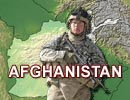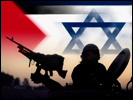 Image by Getty Images via @daylifeSalon Grid
Image by Getty Images via @daylifeSalon GridGadhafi's forces kill hundreds during Libyan protests Sunday
Libyan government intensifies crackdown on protesters as security forces mow down mourners trying to bury victims
Security forces loyal to Libya's Moammar Gadhafi unleashed heavy gunfire Sunday on thousands marching in a rebellious eastern city, cutting down mourners trying to bury victims in a bloody cycle of violence that has killed more than 200 people in the fiercest crackdown on the uprisings in the Arab world.
Western countries expressed concern at the rising violence in oil-rich Libya, which is sandwiched between friendly neighbors Egypt and Tunisia -- where long-serving leaders were successfully toppled in recent weeks. British Foreign Secretary William Hague said he told Gadhafi's son, Seif al-Islam, that the country must embark on "dialogue and implement reforms," the Foreign Office said.
In the first-known defection from Gadhafi's regime, Libya's representative to the Arab League said he resigned his post to protest his government's decision to fire on defiant demonstrators in the second-largest city of Benghazi.
"We are not afraid. We won't turn back," said a teacher who identified herself only as Omneya. She said she was marching at the end of the funeral procession and heard gunfire from two kilometers (just over a mile) away. "If we don't continue, this vile man would crush us with his tanks and bulldozers. If we don't, we won't ever be free."
Omneya, who spoke by telephone, said one of those being buried was a toddler killed Saturday.
Eyewitness reports trickling out of the isolated country where the Internet has been largely shut down and journalists cannot work freely suggested that protesters were fighting back more forcefully against the Middle East's longest-serving leader.
Benghazi is "in a state of war," said Mohamed Abdul-Rahman, a 42-year old merchant, who described how some protesters burned a police headquarters.
Protesters throwing firebombs and stones, got on bulldozers and tried to storm a presidential compound from which troops had fired on the marchers, who included those carrying coffins of the dead from Saturday's unrest in the eastern city, a witness said, speaking on condition of anonymity because of fears of reprisal. The attempt was repulsed by armed forces in the compound, according to the witness and the official JANA news agency, which said a number of attackers and solders were killed.
"Everything is behind that (Gadhafi) compound, hidden behind wall after wall. The doors open and close and soldiers and tanks just come out, always as a surprise, and mostly after dark," resident Jamal Eddin Mohammed told The Associated Press by telephone.
Later, however, a Benghazi resident said he received a telephone text message that an army battalion headed by a local officer was arriving to take over control of the compound, and urging civilians to get out of the way.
Abdul-Rahman, the local merchant, said he saw the battalion chase the pro-Gadhafi militia out of the compound, although it was not clear whether the arriving troops were siding with the local protesters or acting on orders to replace the forces who were firing on the civilians.
Libya's rebellion by those frustrated with Gadhafi's more than 40 years of authoritarian rule has spread to more than a half-dozen eastern cities.
In the capital of Tripoli, considered a Gadhafi stronghold, there have been few reports of protests said to have been quickly put down. Secret police are heavily deployed on the streets of the city of 2 million .
On Sunday, however, armed security forces were seen on rooftops surrounding central Green Square, a witness said by telephone, speaking on condition of anonymity for fear of reprisal. The witness added that a group of about 200 lawyers and judges were protesting inside a Tripoli courthouse, which was also surrounded by security forces.
An exiled opposition leader in Cairo said hundreds of protesters were near the Bab al-Aziziya military camp where Gadhafi lives on the outskirts of Tripoli. Faiz Jibril said his contacts inside Libya were also reporting that hundreds of protesters had gathered in another downtown plaza, Martyrs Square.
Libyan state TV showed a picture of Gadhafi in Tripoli being cheered by supporters, including tribesmen and women chanting "God, Moammar and Libya -- that is all."
Gadhafi has been trying to bring his country out of isolation, announcing in 2003 that he was abandoning his program for weapons of mass destruction, renouncing terrorism and compensating victims of the 1986 La Belle disco bombing in Berlin and the 1988 bombing of a Pan Am airliner over Lockerbie, Scotland.
Those decisions opened the door for warmer relations with the West and the lifting of U.N. and U.S. sanctions. But Gadhafi continues to face allegations of human rights violations. Gadhafi has his own vast oil wealth and his response to protesters is less constrained by any alliances with the West than Egypt or Bahrain, both important U.S. allies.
A doctor at one Benghazi hospital where many of the casualties were taken said 20 people were killed Sunday. U.S.-based Human Rights Watch said 173 people died -- mostly in Benghazi -- in three days of unrest from Thursday through Saturday. A Switzerland-based Libyan activist said 11 people were killed in the city of Beyida on Wednesday. The latest numbers brought the toll to at least 204 since Wednesday, although a precise count has been difficult because of Libya's tight restrictions on reporting.
The Benghazi doctor said his facility is out of supplies and cannot treat more than 70 wounded. He spoke on condition of anonymity for fear of reprisal. He said his hospital treats most of the emergency cases in the city.
Susan Rice, the U.S. ambassador to the United Nations, said the Obama administration was "very concerned" about reports that Libyan security forces had fired on peaceful protesters in the eastern city of Benghazi.
"We've condemned that violence," Rice told "Meet the Press" on NBC. "Our view is that in Libya as throughout the region peaceful protests need to be respected."
The Arab League said it was following with great concern the demonstrations in Arab countries and called for "the immediate halt of all acts of violence and to refrain from using force against the peaceful demonstrations."
In Cairo, Libya's Arab League representative Abdel-Monem al-Houni said he told the Foreign Ministry in Tripoli that he had "resigned from all his duties and joined the popular revolution."
"As a Libyan citizen, I absolutely cannot be quiet about these crimes," he said, adding that he had renounced all links to the regime because of "my complete devotion to my people."
Al-Houni was part of the group that carried out the coup in 1969 that brought Gadhafi to power. He later fell out with the Libyan leader, but they reconciled in 2000. Gadhafi then named him to the Arab League post.
The violence followed the same pattern as the Saturday crackdown, when witnesses said forces loyal to Gadhafi attacked mourners at a funeral for anti-government protesters. They were burying 35 marchers who were slain Friday by government forces.
Sunday's defiant mourners chanted: "The people demand the removal of the regime," which became a mantra for protesters in Egypt and Tunisia.
On Saturday, witnesses said a mix of special commandos, foreign mercenaries and Gadhafi loyalists assaulted demonstrators in Benghazi with knives, assault rifles and other heavy weapons.
The Libyan news agency said authorities arrested "dozens of foreign elements trained to strike at Libya's stability and security." It said an investigation already was under way. It also said authorities were not ruling out that those elements were connected to what it called an Israeli plot to destabilize countries in North Africa, including Libya, as well as Lebanon and Iran.
Hatred of Gadhafi's rule has grown in Benghazi in the past two decades. Anger has focused on the shooting deaths of about 1,200 inmates -- most of them political prisoners -- during prison riots in 1996.
The U.S.-based Arbor Networks reported another Internet service outage in Libya just before midnight Saturday night. The company says online traffic ceased in Libya about 2 a.m. Saturday, was restored at reduced levels several hours later, only to be cut off again that night.
People in Libya also said they can no longer make international telephone calls on their land lines.
In Cairo, exiled Libyans and members of Egypt's Doctors Syndicate have sent urgent medical supplies to Libya. Ayman Shawki, a lawyer in the Egyptian border town of Matrouh, said members of the powerful Awllad Ali tribe whose members live in the border area have volunteered to move the supplies to Libya.






No comments:
Post a Comment